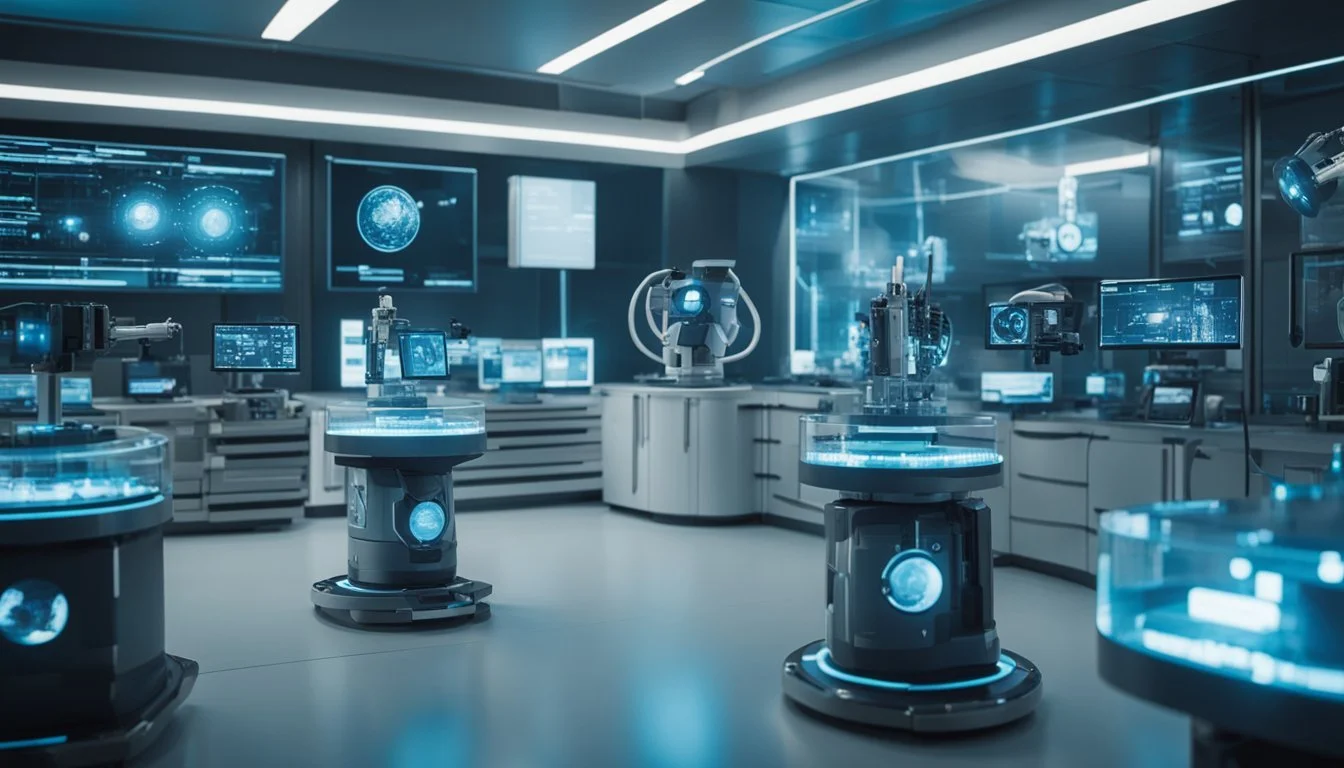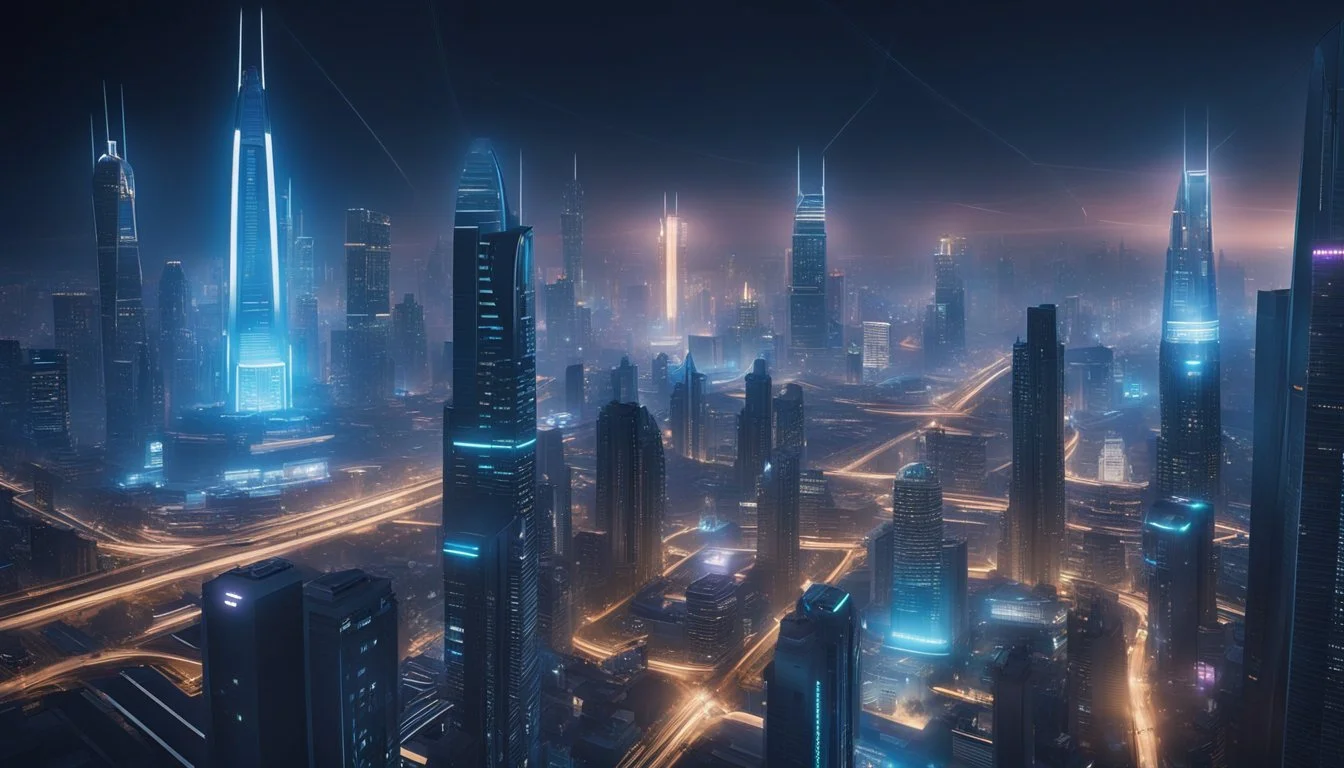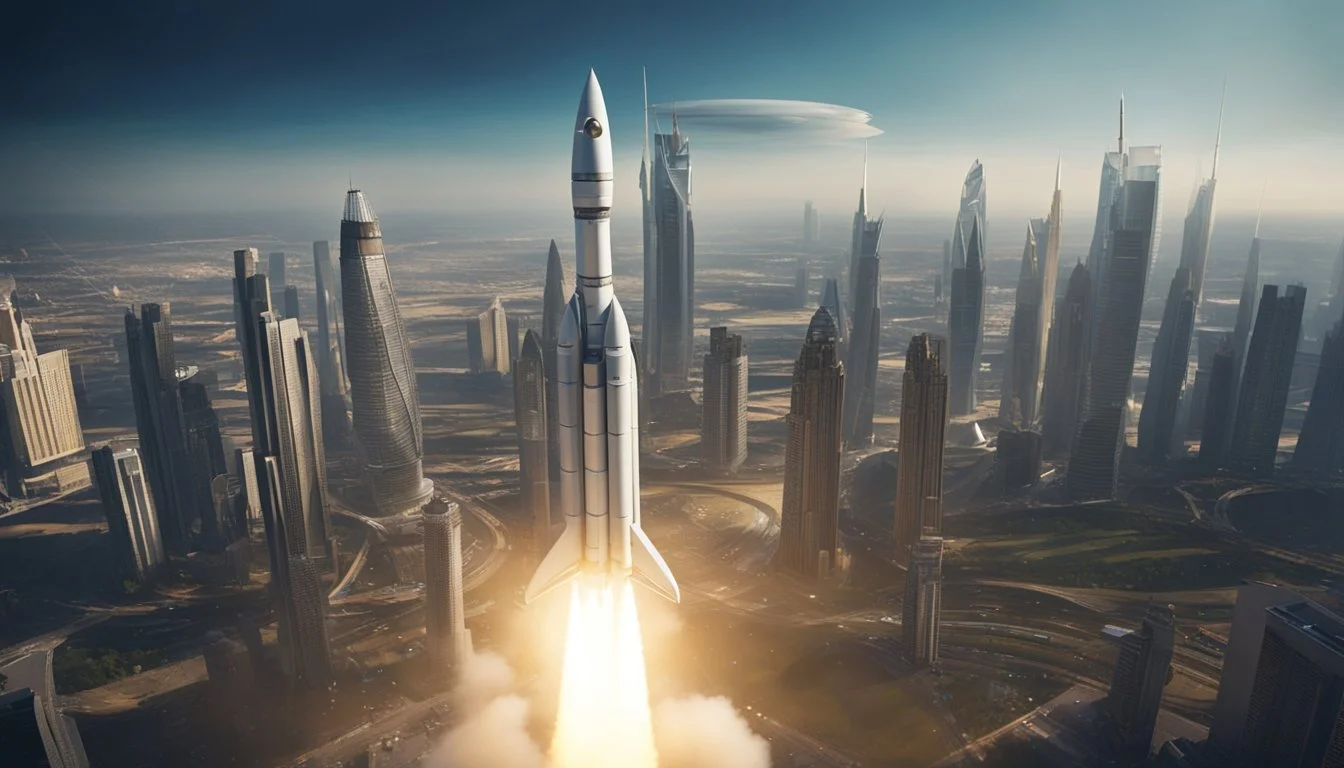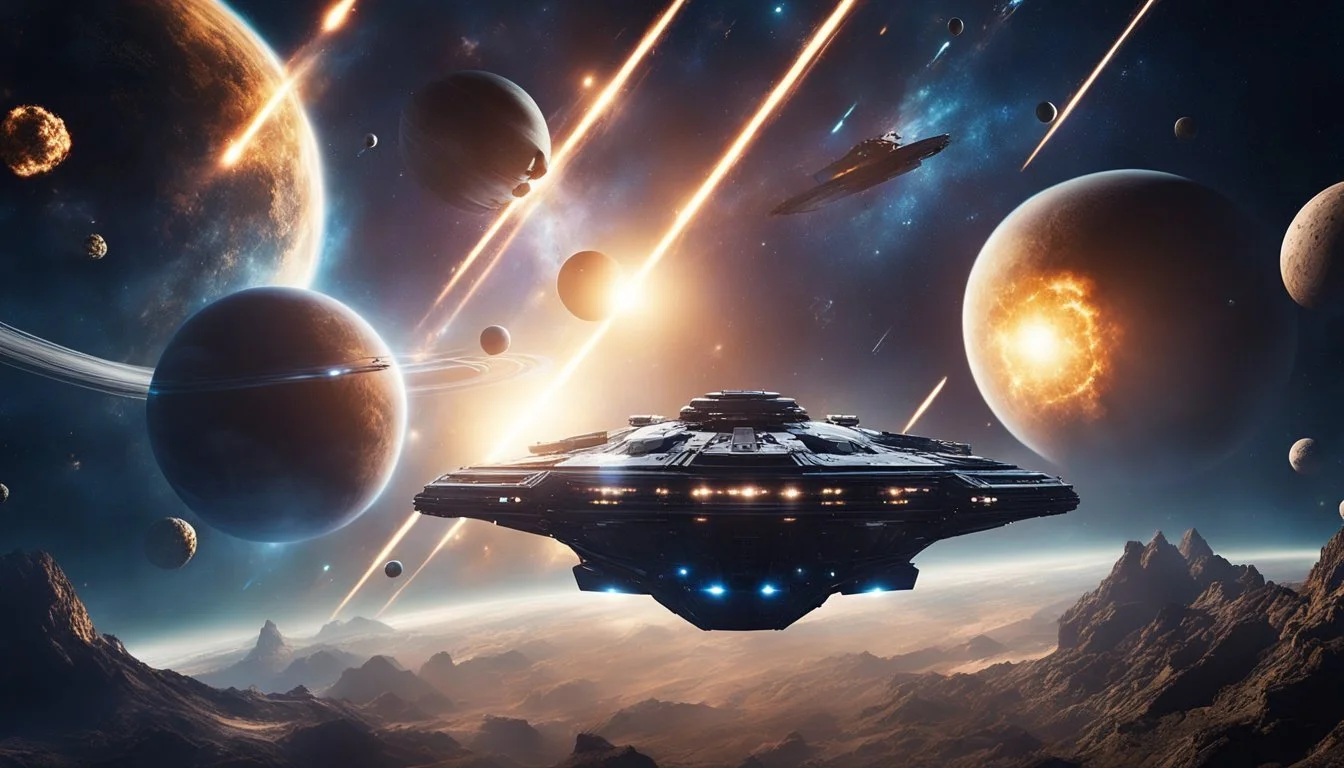11 Documentaries Exploring the World of Science Fiction Literature
A Journey Through Imaginative Realms
Science fiction literature has long captivated readers with its imaginative landscapes, futuristic concepts, and thought-provoking themes. Documentaries focusing on this genre not only explore the works of renowned authors but also delve into the cultural and scientific impacts these stories have had on society.
These cinematic explorations offer insightful perspectives into the minds of visionaries who have shaped the genre and influenced technological advancements. Through visual storytelling, viewers gain a deeper appreciation of the ways science fiction reflects and sometimes predicts real-world scientific and social changes.
1) The Future is Now: Prosthetics in Sci-Fi
Science fiction has long been fascinated with the concept of prosthetics, imagining a future where cybernetic limbs can offer enhanced abilities. This idea has been portrayed in various forms, sparking interest in both the scientific community and the general public.
The revolutionary advancements in robotic prosthetics today often mirror these sci-fi visions. Early portrayals set the stage for public perception and inspired real-world innovation.
Star Wars: Episode V - The Empire Strikes Back (1980) features one of the earliest and most iconic depictions of a robotic hand. Luke Skywalker's prosthetic hand represents the blending of human and machine. IMDB
The Six Million Dollar Man (1974-1978) follows a protagonist with bionic limbs giving him superhuman strength and speed. This TV series highlighted the potential of advanced prosthetics. Wikipedia
Transmetropolitan is a comic series set 2000 years into the future, ambitiously taking the concept of prosthetics further. Characters in this series often have advanced cybernetic augmentations. Wikipedia
These representations often exaggerate capabilities but have undeniably pushed the boundaries of imagination. As technology advances, the gap between science fiction and reality continues to narrow, making previously fictional concepts increasingly plausible.
2) Alien Societies and Galactic Empires
Documentaries about alien societies and galactic empires delve into the vast expanses of space, exploring the intricacies of advanced civilizations and their interstellar interactions.
The Day the Earth Stood Still (1951) examines the arrival of an alien visitor, raising questions about extraterrestrial diplomacy and coexistence. The film highlights the tension between human and alien societies. More Info
Independence Day (1996) portrays a full-scale invasion by an alien empire intent on consuming Earth's resources. It showcases humanity's struggle for survival against a technologically superior force. More Info
E.T. the Extra-Terrestrial (1982) focuses on the friendship between a young boy and a gentle alien stranded on Earth. This heartwarming tale explores themes of loneliness, acceptance, and the bond between different species. More Info
Avatar (2009) delves into the conflict between humans and the Na'vi, an indigenous alien species on the lush planet Pandora. The documentary touches on exploitation, colonialism, and the defense of native habitats. More Info
Close Encounters of the Third Kind (1977) investigates human encounters with extraterrestrials, blending scientific curiosity with the wonder of first contact. It presents a hopeful perspective on interspecies communication. More Info
These documentaries offer a glimpse into the potential dynamics of alien societies and the expansive galactic empires that could exist beyond our current comprehension.
3) The Ethics of AI in Literature
The exploration of AI ethics in literature reveals the complex relationship between humans and technology. Classic works like Isaac Asimov's stories featuring the Three Laws of Robotics have set the stage for ongoing debates about the moral implications of creating intelligent machines. These laws attempt to ensure that robots obey human commands while protecting human lives.
Modern science fiction often portrays AI as possessing human-like qualities, raising questions about autonomy and personhood. In Philip K. Dick's "Do Androids Dream of Electric Sheep?," the line between human and machine blurs, challenging readers to consider the ethical treatment of sentient beings.
Literature frequently uses AI to explore themes of control and freedom. In William Gibson's "Neuromancer," AI entities fight for their independence against human constraints, reflecting real-world concerns about the autonomy and rights of artificial intelligences.
Authors also examine the potential misuse of AI through dystopian narratives. In "The Matrix," human-created AI systems enslave humanity, prompting discussions about the dangers of unchecked technological power and the ethical responsibilities of creators.
These diverse literary perspectives on AI ethics invite readers to reflect on the potential consequences of artificial intelligence. Through imaginative storytelling, science fiction literature continues to be a valuable platform for discussing the moral and ethical dimensions of AI.
For more information:
4) Time Travel: The Ultimate Paradox
Time travel remains one of the most enigmatic and thought-provoking themes in science fiction literature. Documentaries exploring this concept offer insights into its theoretical possibilities and inherent contradictions.
"The Time Machine" (1960) is a classic example that stands out in popular culture. This film, based on H.G. Wells' novel, presents a fictional exploration of time travel and its paradoxical effects. More Information
Documentaries like "Exploring the Reality of Time Travel: Science Fact vs. Science Fiction" dissect the scientific principles underpinning time travel. They juxtapose speculative fiction with established physical laws, providing a balanced view of what could be theoretically possible and what remains speculative.
The BBC's "Is Time Travel Really Possible?" delves into the intricacies of Einstein's theory of relativity. It explains how time dilation — traveling at speeds close to the speed of light — could enable future time travel. More Information
Television episodes like Doctor Who's "Father’s Day" showcase time travel's potential perils. The storyline where Rose Tyler’s actions create a paradox highlights the narrative complexity and emotional stakes of altering history. More Information
Engaging with these documentaries allows viewers to contemplate the fascinating and bewildering nature of time travel. They straddle the line between scientific exploration and imaginative storytelling, offering a range of perspectives on this ultimate paradox.
5) Dystopian Futures and Cautionary Tales
Dystopian futures and cautionary tales in documentaries often explore darker themes prevalent in science fiction literature. These films aim to provide a stark warning about potential societal pitfalls.
780 min - Astronomer Carl Sagan's "Cosmos: A Personal Voyage" (1980)
"Cosmos: A Personal Voyage" delves into the vast universe, offering glimpses into how societal evolution can impact the future. While not explicitly dystopian, its cautionary undercurrents make it a critical watch for understanding humanity's place in the cosmos. More about Cosmos
"Where Olive Trees Weep" (2024)
This documentary portrays the struggles and resilience of people living in war-torn areas. It serves as a poignant reminder of the possible dystopian like realities that some endure daily. More about Where Olive Trees Weep
"Gaza Fights for Freedom" (2019)
Examining the harsh conditions in Gaza, this film portrays real-world dystopian elements through the lens of conflict and survival. It offers a stark view of everyday life amid extreme adversity. More about Gaza Fights for Freedom
"Schooling the World" (2010)
An exploration of the effects of modern education on indigenous cultures, this film highlights the dystopian impact of cultural erosion and the imposition of external values. More about Schooling the World
These documentaries highlight how the themes of dystopian futures and cautionary tales found in science fiction literature can be vividly reflected through real-world issues and narratives. Each film provides a unique perspective on the potential consequences of our choices and actions.
6) Cyberpunk: The Intersection of Man and Machine
Cyberpunk delves into the complex relationship between humanity and technology, often exploring bleak urban environments dominated by high-tech advancements.
Neuromancer: The Birth of Cyberpunk (2024)
This documentary examines William Gibson's seminal work, "Neuromancer," which laid the foundation for the cyberpunk genre. It delves into the book's influence on modern science fiction literature and its visionary portrayal of cyberspace. More Information
Cyberpunk: A Dystopian Future (2014)
Tracing the evolution of cyberpunk from its roots in the 1980s to its current influence, this film explores the genre’s depiction of advanced technology and its societal impacts. Interviews with key authors like Bruce Sterling and Pat Cadigan offer deep insight. More Information
Man vs. Machine: The Cyberpunk Narrative (2018)
This documentary focuses on the recurring theme of man versus machine within cyberpunk. By spotlighting works such as "Blade Runner" and "The Matrix," it analyzes how these stories reflect concerns about artificial intelligence and human identity. More Information
The Aesthetics of Cyberpunk (2012)
Exploring the visual elements of the cyberpunk genre, this film delves into the dark, gritty cityscapes and futuristic technology that define its aesthetic. Featuring interviews with filmmakers and artists, it highlights how visual style shapes narrative themes. More Information
Cyberpunk in Video Games: Beyond Literature (2019)
Examining the impact of cyberpunk on video games, this documentary covers titles like "Cyberpunk 2077" and "Deus Ex." It discusses how these games translate cyberpunk themes into immersive, interactive experiences. More Information
The Philosophical Underpinnings of Cyberpunk (2021)
This film dives into the philosophical questions that cyberpunk literature raises about human nature, technology, and society. Featuring discussions with academics and authors, it explores the genre's deeper meanings and implications. More Information
These documentaries offer a broad look at the multifaceted world of cyberpunk, highlighting how this genre continues to captivate and challenge audiences.
7) Parallel Universes and Alternate Realities
Exploring parallel universes and alternate realities has always intrigued the minds of science fiction writers and filmmakers alike.
Coherence (2013)
A group of friends experiences a series of unsettling events when a comet passes overhead, creating multiple parallel realities. The film delves into the implications of choices made in an altered state of reality. More information.
The Discovery (2017)
Set in a world where the afterlife has been scientifically proven, "The Discovery" explores the moral and philosophical consequences of this knowledge and the alternate realities it opens up. More information.
Sliding Doors (1998)
This film presents two parallel narratives, showing different outcomes based on whether the protagonist catches a train or misses it. It highlights how small choices can lead to vastly different lives in parallel universes. More information.
The Matrix (1999)
An iconic sci-fi movie where the protagonist discovers that the world he lives in is a simulated reality. It poses questions about the nature of reality and the existence of alternate realms. More information.
Doctor Strange (2016)
Marvel's "Doctor Strange" showcases the multiverse concept, where the protagonist learns to manipulate dimensions and navigate alternate realities. This film adds a magical twist to the sci-fi exploration of parallel universes. More information.
Everything Everywhere All at Once (2022)
A cosmic adventure combining kung fu and philosophical musings to explore the meaning of existence across multiple realities. The film stars Michelle Yeoh as a woman who navigates various alternate universes. More information.
Another Earth (2011)
When a duplicate Earth appears in the sky, a tragic accident intertwines two lives. The film explores second chances and the possibility of alternate realities affecting human lives. More information.
8) The Evolution of Space Exploration in Sci-Fi
Science fiction literature has always played a pivotal role in shaping ideas about space exploration. From the early works of Jules Verne to contemporary novels, the genre has evolved in tandem with advancements in space technology.
In the 19th century, Jules Verne's "From the Earth to the Moon" (1865) pioneered the concept of a cannon-propelled spacecraft. His imaginative approach set a foundation for future sci-fi writers. More Information
H.G. Wells' "The First Men in the Moon" (1901) envisioned a journey to the moon using an anti-gravity substance, cavorite. Wells' work showcased the interplay between scientific theory and fiction. More Information
Arthur C. Clarke's "2001: A Space Odyssey" (1968) introduced readers to advanced space travel and artificial intelligence. Clarke's vision paralleled real-world space programs emerging at the time. More Information
Isaac Asimov's "Foundation" series (1951-1993) explored interstellar travel and the concept of a Galactic Empire. Asimov’s work underscored the vast potential of human exploration across galaxies. More Information
Modern sci-fi authors like Andy Weir with "The Martian" (2011) emphasize realistic space travel scenarios. Weir's meticulous research and scientific accuracy brought a new level of credibility to the genre. More Information
Contemporary writers continue to expand the boundaries of space exploration. Their works reflect both current scientific understanding and speculative advancements, pushing the limits of human imagination. Science fiction remains a crucial driver in imagining the future of space exploration.
9) Human Augmentation and Genetic Engineering
Human augmentation and genetic engineering have been central themes in many science fiction documentaries. Exploring these areas offers insights into the ethical and technological implications of enhancing human abilities and manipulating genetic material.
Future Technoculture: Human Enhancement (2016) delves into the advancements and ethical questions surrounding human augmentation. This documentary examines how technology could potentially increase human strength, intelligence, and lifespan. IMDB
The Science of Immortality (2020) examines how genetic engineering might extend human life. It highlights the strides made in gene editing technologies like CRISPR and their potential to combat aging and diseases. IMDB
Playing God (2017) focuses on the societal and ethical ramifications of human genetic engineering. This film dives into the debate on designer babies and the possibility of tailoring human genetics. IMDB
Homo Sapiens 2.0: The Making of a Cyborg (2018) explores the merging of humans and technology. It discusses advancements in neural implants and prosthetics, blurring the lines between human and machine. IMDB
More Human Than Human (2018) investigates the future of artificial intelligence in human augmentation. This documentary looks at how AI can enhance cognitive abilities and the ethical dilemmas involved. IMDB
Human Nature (2019) dives into CRISPR and its transformative potential. It covers the history, scientific principles, and controversial aspects of gene editing. IMDB
Gattaca: The Science Behind the Fiction (2007) analyzes the science and projected future of genetic engineering as depicted in the movie "Gattaca." It discusses real-world genetic research inspired by the film. IMDB
The Gene: An Intimate History (2020) is a comprehensive look at genetics. This series explores both the science and heritage of genetics, emphasizing key developments and future possibilities. IMDB
Upgrade Me: The Transhumanist Agenda (2019) examines the movement towards human augmentation and enhancement. It investigates how far current science is from turning these futuristic ideas into reality. IMDB
10) The Role of AI in Human Evolution
The integration of artificial intelligence (AI) has significantly impacted human evolution, influencing both technological advancements and societal development.
AI has contributed to unprecedented growth in various fields, including medicine, where machine learning algorithms analyze complex data, leading to breakthroughs in diagnostics and treatment.
Moreover, AI has reshaped industries by optimizing processes and improving efficiencies. Automated systems in manufacturing, for instance, significantly reduce human error and increase productivity.
In science fiction, authors and filmmakers have often depicted AI as a critical element in human evolution. Isaac Asimov's stories, particularly his Three Laws of Robotics, have stimulated discussions about ethical AI development IMDB (2004).
Movies like "Ex Machina" IMDB (2015) explore themes of human-AI interaction, highlighting the potential and risks involved in creating sentient machines.
These fictional narratives often reflect real-world concerns about AI's role in society, sparking debates on how to balance innovation with ethical considerations.
11) Intergalactic Conflicts and Space Wars
Exploring the future often involves imagining conflicts on a galactic scale. Documentaries in this genre provide a glimpse into the potential for interstellar warfare and the political ramifications that could ensue.
One notable documentary is "Space Wars: Are We Ready?" (2019). This film delves into the concept of a Space Force and examines historical efforts to establish rules of engagement in space. IMDB
"Mars: Dead or Alive" (2003) explores the scientific and logistical challenges of Mars exploration and touches upon the competitive aspects of international space missions. IMDb
Another insightful film is "Fight for Space" (2016). This documentary investigates the history and future of human spaceflight programs and the political and military motivations behind them. Wikipedia
Lastly, "The Farthest: Voyager in Space" (2017) chronicles the Voyager missions, discussing the implications of humanity’s first steps into interstellar space and the potential for future interstellar missions. IMDb
These documentaries provide a grounded look at how scientific advancements and political ambitions may shape future intergalactic conflicts. Through expert interviews and historical context, they highlight the intricate relationship between space exploration and potential space warfare.
The History of Science Fiction Documentaries
Science fiction documentaries delve into the imaginative realm of sci-fi literature and film, showcasing key themes and influential works. From early literature's visionary tales to the genre's evolution in film, these documentaries offer a thorough exploration of science fiction's rich history.
Early Influences in Film and Literature
The roots of science fiction documentaries can be traced back to early literary works and film adaptations. Jules Verne's groundbreaking novels, such as Twenty Thousand Leagues Under the Sea, laid the foundation for science fiction storytelling. These early stories inspired filmmakers to bring imaginative concepts to the screen.
H.G. Wells' The War of the Worlds introduced audiences to the alien invasion genre, revolutionizing both literature and cinema. The adaptation of such works into early films set the stage for documentaries to explore how these pioneering ideas influenced the entire genre.
Evolution of the Genre
As the genre matured, science fiction documentaries began examining the technological advancements and cultural shifts reflected in sci-fi films and literature. These documentaries featured interviews with creators who shaped the genre, providing insight into the creative processes behind iconic works.
Stanley Kubrick's 2001: A Space Odyssey is frequently highlighted for its realistic portrayal of space, showcasing the genre's evolution. Modern documentaries also explore the impact of series like Star Trek, which not only entertained but also inspired real-world advancements in space exploration.
Science fiction documentaries continue to evolve, reflecting the genre’s growth and its influence on both pop culture and real scientific progress.
Prominent Themes Explored
Science fiction literature often explores futuristic ideas and technological advancements, as well as deep reflections on social and ethical issues, making it a rich field for documentary exploration.
Futurism and Technological Advancements
Science fiction often focuses on advancements in technology and their impact on society. Virtual reality, for instance, blurs the lines between the digital and physical worlds, as seen in Ready Player One.
Genetic engineering and biotechnology are frequently explored, presenting ethical dilemmas and the possibility of superhumans.
Space exploration remains a central theme, exemplified in stories like The Martian, which tackle the challenges and wonders of life beyond Earth. These themes not only entertain but also provoke thought about our future and the role of science and technology.
Social Commentary and Human Condition
Dystopian narratives are a staple in science fiction, often illustrating the extreme consequences of societal trends. These stories, such as in 1984, provide a critical view of contemporary issues by projecting them into a nightmarish future.
Social structures and their transformation are examined through the lens of sci-fi literature. This involves scrutinizing power dynamics, inequality, and the human response to oppression and revolution.
Human identity and consciousness are another important theme, questioning what it means to be human in a technologically advanced world. Through these explorations, science fiction holds up a mirror to the real world, prompting reflection and dialogue on pressing social issues.
Influence of Science Fiction Literature on Filmmakers
Science fiction literature has profoundly shaped the film industry. Authors of iconic science fiction works have inspired generations of filmmakers, leading to countless cinematic adaptations that have left an indelible mark on both genres.
Iconic Authors and Their Impact
Philip K. Dick is a prime example. His works, such as "Do Androids Dream of Electric Sheep?", have led to influential films like Blade Runner. Filmmakers are drawn to his exploration of reality and consciousness.
Isaac Asimov's "Robot" series introduced the famous Three Laws of Robotics, influencing movies like I, Robot. His scientific rigor and imaginative storytelling offer rich material for visual interpretation.
Arthur C. Clarke’s collaboration with Stanley Kubrick for 2001: A Space Odyssey showcased how literature and film can create groundbreaking narratives and visuals that push the boundaries of human imagination.
Cinematic Adaptations
The translation of science fiction literature to film has yielded both critically acclaimed and commercially successful works. "Dune", originally a novel by Frank Herbert, has seen multiple adaptations. The latest version, directed by Denis Villeneuve, received praise for its faithful yet innovative approach to the source material.
Jules Verne's novels, including "20,000 Leagues Under the Sea" and "Journey to the Center of the Earth", have been adapted numerous times. These films often capitalize on Verne’s adventurous and detailed storytelling, bringing his imaginative worlds to life.
Additionally, George Orwell's "1984", a dystopian novel, has been adapted several times, resonating with contemporary audiences who see parallels with modern societal issues.
By continually revisiting and reimagining these timeless works, filmmakers keep the spirit of science fiction literature alive on the big screen.












